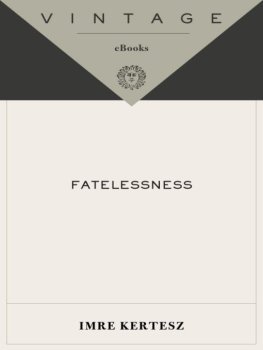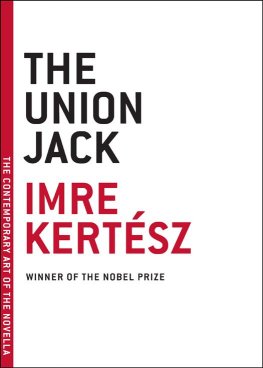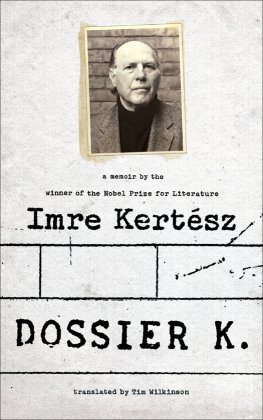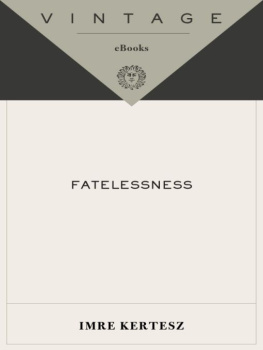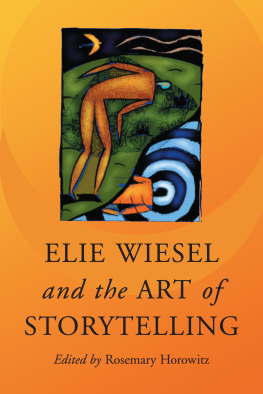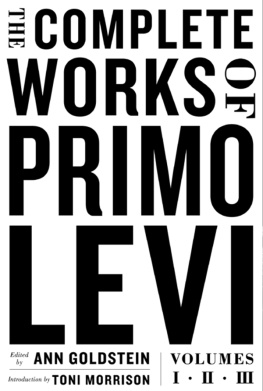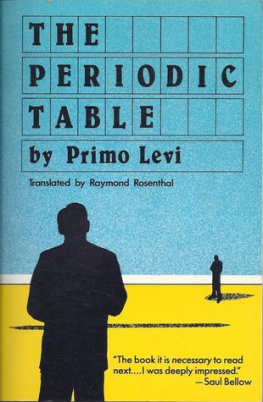

Imre Kertsz, who was born in 1929 and imprisoned in Buchenwald as a youth, worked as a journalist and playwright before publishing Fatelessness, his first novel, in 1975. He is the author of Looking for a Clue, Detective Story, The Failure, The Union Jack, Kaddish for an Unborn Child, and Galley-Slaves Journal. He was awarded the Nobel Prize for literature in 2002. He lives in Budapest and Berlin.
A Note About the Translator
Born in England in 1947, Tim Wilkinson first began translating from Hungarian after living and working in Budapest during the early 1970s. He has translated a number of works of history, including va Balzss Hungary and the Habsburgs 17651800, Domokos Kosrys Hungary and International Politics in 18481849, and Viktor Kardys The Jews of Europe in the Modern Era, as well as literary works by many contemporary Hungarian prose writers.
Fatelessness
Looking for a Clue
Detective Story
The Failure
The Union Jack
Kaddish for an Unborn Child
Galley-Slaves Journal
Someone Else
Liquidation
I didnt go to school today. Or rather, I did go, but only to ask my class teachers permission to take the day off. I also handed him the letter in which, referring to family reasons, my father requested that I be excused. He asked what the family reason might be. I told him my father had been called up for labor service; after that he didnt raise a further peep against it.
I didnt head home but to our shop. Father had said they would wait for me there. He added that I should hurry as well because he might need me. In actual fact, that was partly why he had asked me to be let off school. Or else so that he might have me there on his last day before being separated from home, since he said that too, though admittedly some other time. He said it to my mother, as I recall, when he phoned her this morning. Today is a Thursday, as it happens, and on Thursdays and Sundays my afternoons, strictly speaking, belong to my mother. Still, Father informed her: I cant let you have young Gyuri today, and then went on to give that as the reason. Though maybe it wasnt like that after all. I was rather sleepy this morning on account of last nights air-raid warning, so perhaps I dont remember it clearly. I am quite sure, though, that he said it if not to Mother, then to someone else.
I too spoke a few words to Mother, though I no longer remember what. I think she may have been annoyed with me because I was obliged to be a little short with her, what with Father being there: after all, today it is his wishes I have to consider. When I was about to set off from the house, even my stepmother had a few private words with me in the hall, just between the two of us. She said she hoped that, on what was such a sad day for us, she could count on my behaving appropriately. I had no clue what I could say to that, so I said nothing. She may have misinterpreted my silence, however, because she went straight on to say something along the lines that she had no wish to offend my sensibilities with those words of advice, which, she was well aware, were quite unnecessary. She had no doubt that with me being a big boy, now in my fifteenth year, I was quite capable of grasping for myself the gravity of the blow that had been inflicted on us, as she put it. I nodded. I could see she was content to leave it at that. She even moved a hand in my direction, and I half feared that she might perhaps be wanting to hug me. She didnt do so in the end, just let out a deep sigh, with a long, tremulous release of breath. I noticed her eyes moistening as well. It was awkward. After that, I was allowed to go.
I covered the stretch between school and our shop on foot. It was a clear, balmy morning, considering it was still just early spring. I was about to unbutton myself but then had second thoughts: it was possible that, light as the head breeze was, my coat lapel might flap back and cover up my yellow star, which would not have been in conformity with the regulations. There were by now a few things I had to be more on my guard against. Our cellar timber store is nearby, on a side street. A steep stairway leads down into the gloom. I found my father and stepmother in the office, a glass cage lit up like an aquarium, right at the foot of the steps. Also with them was Mr. St, whom I have known from the time he entered our employment as a bookkeeper and as manager of the other, outdoor lumberyard that he has in fact already purchased from us since then. At least thats what they say, because Mr. St, given that he is completely aboveboard regarding his race, does not wear a yellow star, so the whole thing is actually just a kind of business dodge, as I understand it, enabling him to look after our property there, and then again so we dont have to do entirely without an income in the meanwhile.
That had a bit to do with why I greeted him differently from the way I used to do, for after all he has, in a sense, risen to a higher status than us; my father and stepmother too were clearly more deferential toward him. Though he, for his part, sticks all the more stubbornly to addressing my father as boss and my stepmother as my dear lady, as if nothing had happened, never failing to plant a kiss on her hand while he is at it. He welcomed me as well in his old, jocular tone, oblivious to my yellow star. After that, I stood where I was, by the door, while they picked up where they had left off on my arrival. As I saw it, I must have interrupted them right in the middle of some discussion. I did not understand at first what they were talking about. I even closed my eyes for a second because they were still a bit dazzled from the sunlight up on the street. Meanwhile my father said something, and by the time I opened them, there was Mr. St. Yellowish red light-spots were dancing like bursting pustules all over his round, brownish-skinned features, with the pencil moustache and the tiny gap between his two broad, white front teeth. The next sentence was again spoken by my father, with something about goods that it would be best if Mr. St were to take with him right away. Mr. St had no objection, whereupon my father took out from a desk drawer a small package wrapped in tissue paper and tied up with string. Only then did I see what goods they were actually talking about, since I immediately recognized the package from its flat shape: it contained a box. In the box were our more precious jewels and such; indeed, I rather fancy that it was precisely on my account that they had called them goods, lest I recognize them. Mr. St at once thrust it into his briefcase. After that, however, a minor dispute sprang up between them, because Mr. St took out his fountain pen, with the aim of giving my father a receipt for the goods no matter what. He dug in his heels for a fair while, even though my father told him dont be childish, and theres no need for that sort of thing between the two of us. I noticed that pleased Mr. St to no end. He said so too: Im well aware that you trust me, boss, but in real life there is a right and proper way of doing things. He even appealed to my stepmother for her assistance: Isnt that so, my dear lady? With a wan smile, though, she merely said something to the effect that she left it entirely up to the men how the matter was best arranged.
Next page
